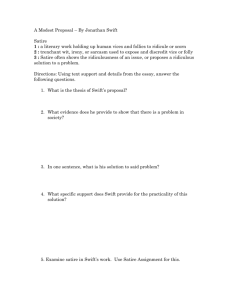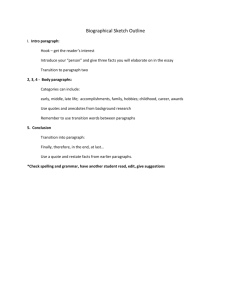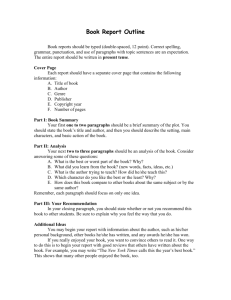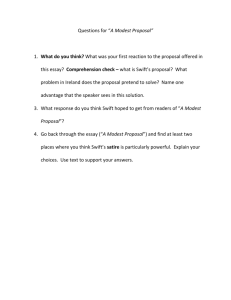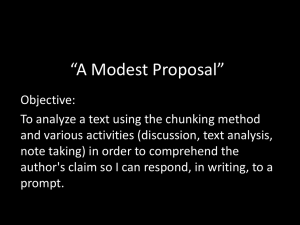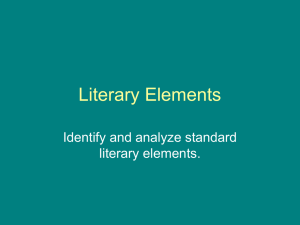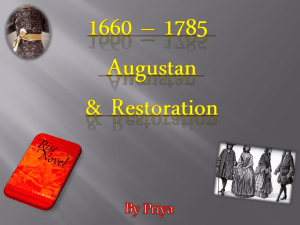1.27-1.29 A Modest Proposal - TJ
advertisement
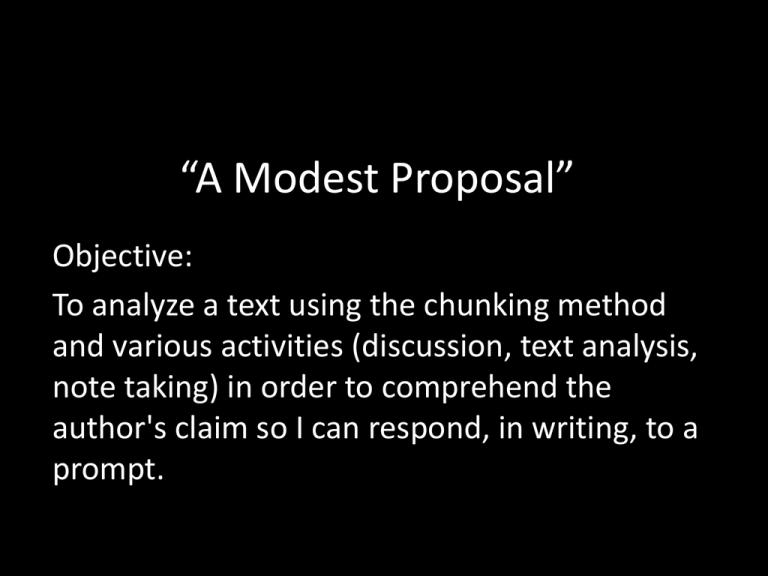
“A Modest Proposal” Objective: To analyze a text using the chunking method and various activities (discussion, text analysis, note taking) in order to comprehend the author's claim so I can respond, in writing, to a prompt. Quickwrite • “Satire is a sort of glass wherein beholders do generally discover everybody’s face but their own; which is the chief reason for that kind reception it meets with in the world, and that so very few are offended with it.” ~Jonathan Swift, 1667-1745 • Explain what this quote means in your own words and if you agree or disagree. Vocabulary • Hyperbole: – overstatement using exaggerated language • Understatement: – Presenting something as being smaller or less important than what it is • Humor: – The quality of being amusing or comic (dark humor is morbid or deals with taboo issues) • Pun: – exploiting the different possible meanings of a word • Incongruity: – not harmonious in character; inconsonant; lacking harmony of parts: What is Satire? • satire Paragraphs 1-6 • Collect 6-10 words that you need to clarify • Define each word. Explain your connotations of each word. • What tone words would you use to describe this type of diction • What is the problem in Ireland? SOAPSTone • What is the speaker’s background – where is he from? What is his social class? Is he Irish or English? Is he rich or poor? What perspective does he have? • What kind of personality does the speaker seem to have from the language he uses in paragraphs 1 -6? This is not the same person as Swift. • What is Swift doing by creating this other persona? • What does Swift want the reader to think about this speaker? • O-occasion, A-audience, P-purpose, S-subject, Ttone Paragraphs 7-9 (page 703) • Swift’s essay turns from mildly ironic to darkly satirical. What key phrases, in your opinion, most indicative of this turn? • Write a complex sentence in which you describe the shift from mildly ironic to darkly satirical using supporting details from the text. • --You should create a compound/complex sentence with a transition word and correct punctuation. Paragraphs 10-20 Process Analysis: explains HOW by describing the process or the steps that will need to happen to achieve a desired outcome • Describe the process analysis that happens in paragraphs 10-20 • Make a short note for each paragraph Paragraphs 21-26 • Between paragraphs 21 – 26, Swift delineates various arguments to support his proposal. Identify three of the arguments and explain the underlying premises that they rely on (logical, emotional, credibility) • What (DID) diction, imagery, detail supports this appeal? Paragraphs 27-30 • What is an expedient? • What does Swift suggest as “other expedients”? Paragraph 31- 32 Transform paragraph 32 into the literal, serious argument that Swift is making in this essay. • It is possible to do this only by deleting certain words, but you may want to add certain words if the deletion task proves too challenging. Paragraph 33 • The persona Swift creates builds his credibility in the final paragraph by… Satire • Satire: the use of humor, irony, exaggeration, or ridicule to expose and criticize people's stupidity or vices, particularly in the context of contemporary politics and other topical issues. Examples and Explanations • Complete the graphic organizer – Use paragraph numbers and first SOAPSTone for Satire • Speaker= usually a persona created to represent the group being ridiculed • Occasion= political or current issues that are not just • Audience= usually the political or social group being ridiculed and humorous for the group who sees through them • Purpose= to shock or belittle society into making a change • Subject= unjust or unfair or prejudices • Tone= sarcastic, humorous, facetious, ironic, inane Reminders • Thesis statement/intro. Should include elements of SOAPSTone but MUST include the Purpose or Message • In Satire, what is said is not always what is literally meant (Think sarcasm. Often times it is the very opposite) • Work from the beginning to the end of the passage rather than by chunking rhetorical techniques
